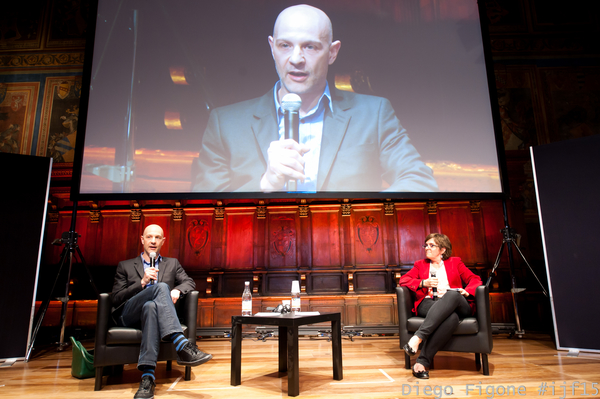
Around 588 billion unique news feeds are created each month on Facebook. The social media’s 1.4 billion monthly users log into Facebook on average 14 times a day. “Each time, each person loads a unique news feed,” said Andy Mitchell, Director of News and Media Partnerships at Facebook. “News is a big part of what people connect about,” he added.
The potential for news feeds to replace newsstands is very well understood by the social media. About 20% of referrals to news publishers come from the Facebook, but more could be done, said Mitchell: “What Facebook is doing is to try to fix the news consumption experience.”
Mobile news consumption in particular is important to Facebook. As an increasing number of news organisations create content specifically for mobile and social media sharing, Facebook is expanding its product offer for news publishers.
In his keynote speech, Mitchell presented four new products developed to answer publishers’ concerns over social media news sharing. These are supposed to allow publishers an ever more accurate targeting of readers to maximise chances of content sharing and engagement.
Smart publishing, one of the new products, gives publishers the option to allow Facebook to automatically post content that is proving most successful in engaging users. This function, Mitchell explained, can be switched on and off at the publishers’ convenience, for instance when the editorial team is off in the evening or weekends.
This and other seemingly convenient Facebook products, like the ‘trending stories’ sidebar currently available in Anglophone countries, require news publishers to increasingly rely on Facebook and its algorithms to control the way the publisher’s brand and its content are represented. As the questions from the public to Mitchell showed, people in the industry are uneasy with relinquishing this control.
Mitchell brushed off concerns over censorship, accountability, and algorithmic news control by possibly understating Facebook’s current and future ambitions: “Facebook should not necessarily be the only way people consume news, it should be complementary,” he said first, and then: “It’s not like we are aspiring to become the first news source for people.”
Despite Mitchell’s best attempt at reassuring that users retain control over content (“We don’t control the news feed, you control the news feed”), the controversy is unlikely to wind down. People like Jay Rosen, Professor at New York University, and Felix Salmon, Senior Editor at Fusion, keep questioning the implications of allowing an algorithm to distribute news – questions that, as Mitchell hurriedly left the room, have yet to receive a satisfactory answer.